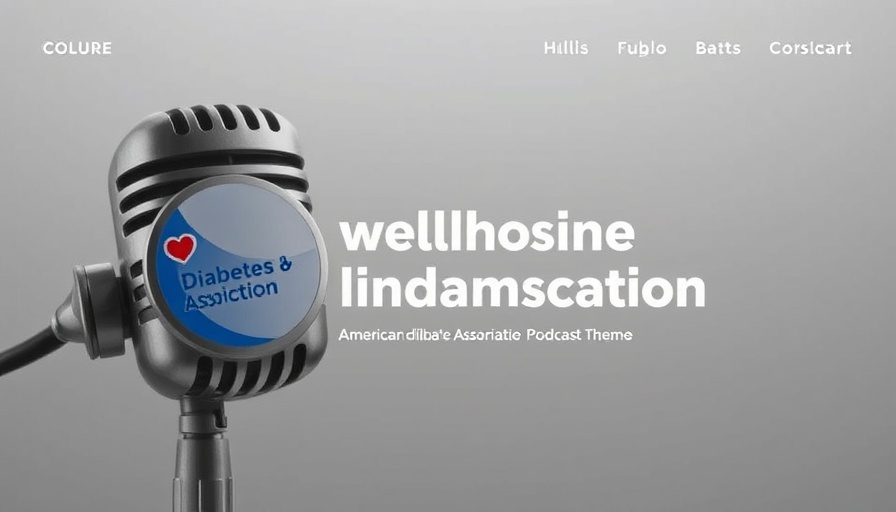
Understanding the Complexity of Type 1 Diabetes
Type 1 diabetes (T1D) is often perceived as a single clinical entity; however, emerging research suggests a notable diversity within its diagnosis and treatment. In a recent podcast episode of Diabetes Care on Air, experts highlighted the heterogeneity of T1D—a term that reflects the variability in clinical presentation, progression, and response to treatment among individuals with the disease. Dr. Carmela Evans Molina, a leading authority in pediatric diabetes, stressed the importance of recognizing these differences to tailor therapeutic approaches that better meet the needs of affected individuals.
In 'Carmella Evans-Molina on the heterogeneity of type 1 diabetes,' the discussion dives into critical insights on diabetes research which prompted a deeper analysis from our side.
The Significance of Heterogeneity in Diabetes Treatment
Heterogeneity in T1D refers not only to the diverse genetic, immunologic, and metabolic factors influencing disease progression but also encompasses the differences in age-related responses to therapies. For instance, children commonly exhibit a more aggressive form of T1D compared to adults. These distinctions necessitate an individualized treatment approach—a key element underscored by Dr. Evans Molina during her discussion on recent clinical advancements, including disease-modifying therapies like Teplizumab.
Your Health Strategy: The Role of Nutrition and Counseling
For those living with T1D and their care teams—including nurses, counselors, and nutritionists—understanding the disease's complexity is vital. Individualized care plans that take into account a patient’s unique genetic predispositions, lifestyle, and nutritional habits can significantly affect diabetes management. Nutrition plays a paramount role; aligning dietary choices with disease management goals can aid in stabilizing blood glucose levels. Education by diabetes counselors and nutritionists can empower patients to make informed dietary choices that align with their health objectives.
Predictive Factors for Disease Progression
The podcast delved deeply into predictive genetic and immunological factors that contribute to the disease’s progression. Research shows that over 50% of the genetic risk for T1D is associated with specific HLA genes involved in autoimmune responses. However, many unknowns remain. Future research efforts aim to identify particular genetic markers that might predict individual responses to therapeutic interventions.
The Future of Type 1 Diabetes Management
Looking ahead, the research presented highlights a crucial crossroads in diabetes therapy. The advent of stem cell therapies and advancements in immunomodulation stand to revolutionize treatment paradigms. Nevertheless, understanding the specific endotypes—defined as distinct disease pathophysiologies that could be targeted by tailored therapies—remains an aspirational goal. Dr. Evans Molina mentioned that identifying these endotypes would not only improve treatment success rates but might also elucidate how varied responses arise.
Real-World Implications of Research Findings
The discussion culminated in a call for health professionals to be proactive in investigating individual patient needs. As clinicians, diabetes doctors must consider not just glycemic control, but also the overall well-being of their patients. Factors like age, lifestyle, and coexisting health conditions should guide treatment decisions to avoid overtreatment, particularly in older adults where the risks of intensively lowering glucose through medications might not yield significant benefits.
Understanding the Broader Impact of Diabetes Research
As the community grapples with the complexities of diabetes, public health policy must adapt to support research initiatives aimed at elucidating these intricacies. The challenges surrounding diabetes care extend beyond clinical treatment to encompass systemic issues that affect care delivery, accessibility to modern therapies, and public education on diabetes management.
Your Role as an Advocate for Healthy Living
With diabetes and pre-diabetes prevalence rising globally, it is essential for individuals affected by T1D and their circles to advocate for informed health practices. Whether through community engagement, promoting nutrition education, or seeking support from diabetes counselors, every action contributes to a more robust framework for effective diabetes management.
Call to Action: Advocate for Yourself and Others
In conclusion, navigating the complexities of type 1 diabetes requires collaboration among healthcare providers, patients, and researchers. Stay informed about the latest advancements and engage actively in your healthcare journey. Share this knowledge with friends, family, or the broader community to promote a culture that supports healthy lifestyles. Together, we can empower ourselves and others in the fight against diabetes.
 Add Row
Add Row  Add
Add 




Write A Comment